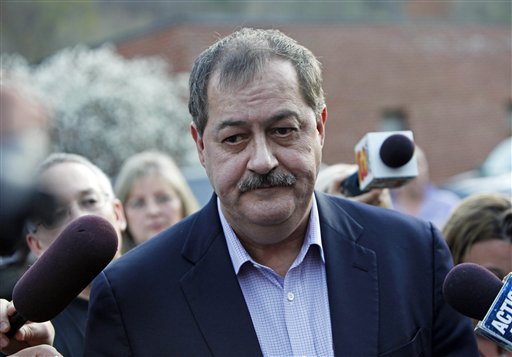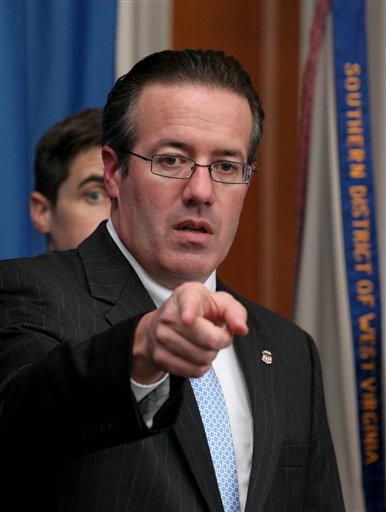Blankenship legal fee lawsuit backfires
October 5, 2015 by Ken Ward Jr.
Maybe it seemed like a good idea at the time, back in February:
Former Massey Energy CEO Don Blankenship sued Alpha Natural Resources this week, alleging that the company has reneged on an agreement requiring Alpha to pay his mounting legal costs — already more than $3 million — to defend against a major criminal indictment alleging that he orchestrated safety violations at Massey’s Upper Big Branch Mine prior to an April 2010 explosion that killed 29 miners.
Blankenship filed the new legal action Thursday, just one day before Friday’s deadline for pre-trial motions in the criminal case against him in U.S. District Court, in Beckley. That trial is scheduled to start April 20.
Blankenship alleges that Alpha — which bought Massey in June 2011 — informed him in late January that the company would not cover the legal fees and costs incurred in his defense against the four-count indictment that charges him with mine safety and securities violations.
“The defendants recently reneged on their agreements for mandatory advancement of the plaintiff’s attorneys’ fees and expenses, a development which has threatened his ability to mount a defense,” Blankenship’s lawyers say in their filing.
And Blankenship probably was pretty pleased with the official outcome, when a Delaware judge ordered Alpha to pay up — at the time the former Massey CEO’s legal bills, as of April 1, were nearly $6 million.
But given what we know now, you have to wonder if Don Blankenship will end up regretting that legal fees lawsuit. As we reported on Sunday in the Gazette-Mail, a potential new witness against Blankenship surfaced in that Delaware case. And according to a Sunday night legal filing (detailed here in today’s Gazette-Mail), this new witness — former Massey ventilation expert Bill Ross — could provide prosecutors with remarkably strong testimony in the trial:
Less than a year before the Upper Big Branch Mine Disaster, then-Massey Energy CEO Don Blankenship was warned by one of Massey’s top safety officials about serious problems at his company’s operations, according to a new memo that surfaced earlier this year and now is among the key evidence prosecutors hope to use to prove criminal charges against Blankenship.
The June 25, 2009, memo to Blankenship from then-Massey lawyer Stephanie Ojeda summarized the safety concerns being raised by Bill Ross, a former U.S. Mine Safety and Health Administration official who had left MSHA for a job as a top mine ventilation expert for Massey …
Ojeda wrote that the memo was a report of a meeting she held with Ross and Suboleski on June 17, 2009, to discuss safety violations Massey operations were receiving. Ross had talked to a variety of Massey miners and became extremely concerned.
“Bill has often heard in his travels around Massey, ‘We have been told to run, run, run, no matter what. We will fix it when they find it,’ ” the memo from Ojeda says. “Bill explains that this is no way to run a coal mining business. When we receive one violation, it means that we have failed.”

We don’t know the timing for sure, but the legal filing from U.S. Attorney Booth Goodwin strongly suggests that prosecutors didn’t really know the full extent of what Ross might have to say until information about him surfaced in the Delaware legal fees case:
… While the United States did not obtain the memorandum until 5 years after the investigation began and months after the original indictment was returned in this case …
By way of background, remember that in the legal fees case, Alpha was trying to argue that it no longer had to pay Blankenship’s legal fees because it had determined he had reason to believe his actions were illegal. And while some of the Ross documents appear to have been claimed by Alpha as confidential attorney-client or attorney work product materials, the judge in Delaware said the company couldn’t both use such materials to make its case against Blankenship and keep them confidential.
Also keep in mind that the Blankenship defense team’s Sunday afternoon motion to prohibit the government from discussing Ross in its opening statement at trial suggests there is more to Ross than just the one memo we have now seen:
We understand that the government expects to call Mr. Ross to testify about (a) conversations he had with two Massey executives that were memorialized in a memorandum forwarded to Mr. Blankenship (b) a memorandum he drafted for Mr. Blankenship and (c) a conversation he had with Mr. Blankenship.
It’s no wonder, then, that the Blankenship team included this suggestion for more court secrecy in their motion:
The parties can make available in camera the relevant documents.

 Subscribe to the Coal Tattoo
Subscribe to the Coal Tattoo
